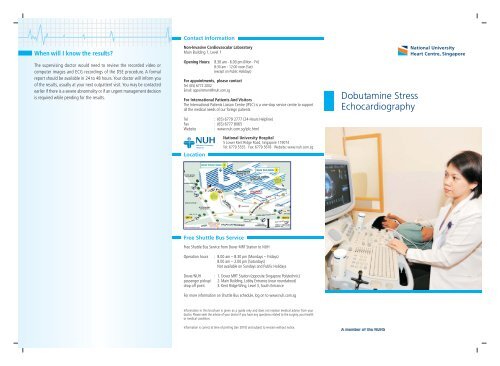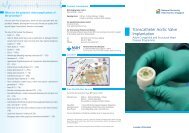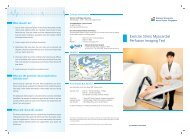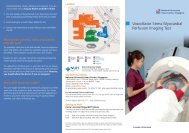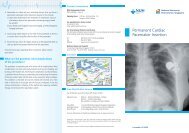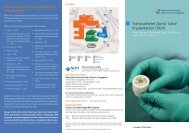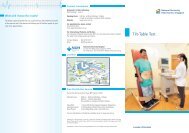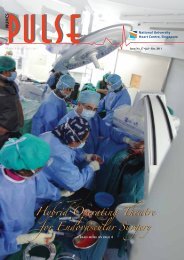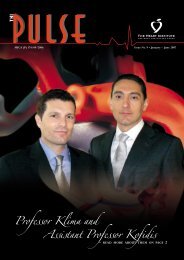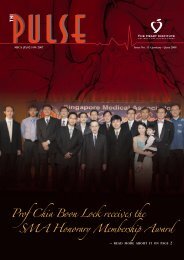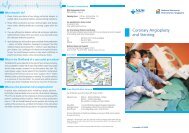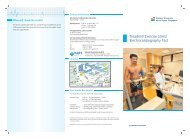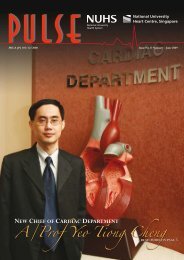Dobutamine stress echocardiography - nuhcs
Dobutamine stress echocardiography - nuhcs
Dobutamine stress echocardiography - nuhcs
You also want an ePaper? Increase the reach of your titles
YUMPU automatically turns print PDFs into web optimized ePapers that Google loves.
When will I know the results?The supervising doctor would need to review the recorded video orcomputer images and ECG recordings of the DSE procedure. A formalreport should be available in 24 to 48 hours. Your doctor will inform youof the results, usually at your next outpatient visit. You may be contactedearlier if there is a severe abnormality or if an urgent management decisionis required while pending for the results.Contact informationNon-Invasive Cardiovascular LaboratoryMain Building 1, Level 1Opening Hours: 8.30 am - 6.00 pm (Mon - Fri)8:30 am - 12:00 noon (Sat)(except on Public Holidays)For appointments, please contactTel: (65) 6772 2002Email: appointment@nuh.com.sgFor International Patients And VisitorsThe International Patients Liaison Centre (IPLC) is a one-stop service centre to supportall the medical needs of our foreign patientsTel: (65) 6779 2777 (24-Hours Helpline)Fax : (65) 6777 8065Website : www.nuh.com.sg/iplc.html<strong>Dobutamine</strong> StressEchocardiographyLocationNational University Hospital5 Lower Kent Ridge Road, Singapore 119074Tel: 6779 5555 Fax: 6779 5678 Website: www.nuh.com.sgFree Shuttle Bus ServiceFree Shuttle Bus Service from Dover MRT Station to NUHOperation hoursDover/NUHpassenger pickup/drop off point: 8.00 am – 8.30 pm (Mondays – Fridays)8.00 am – 2.00 pm (Saturdays)Not available on Sundays and Public Holidays: 1. Dover MRT Station (opposite Singapore Polytechnic)2. Main Building, Lobby Entrance (near roundabout)3. Kent Ridge Wing, Level 3, South EntranceFor more information on Shuttle Bus schedule, log on to www.nuh.com.sgInformation in this brochure is given as a guide only and does not replace medical advice from yourdoctor. Please seek the advice of your doctor if you have any questions related to the surgery, your healthor medical condition.Information is correct at time of printing (Jan 2010) and subject to revision without notice.
What is dobutamine <strong>stress</strong> <strong>echocardiography</strong>?Echocardiography uses ultrasound waves (high-frequency sound waves) tovisualise the heart and blood vessels. Ultrasound images of the movingheart can be obtained in various planes and displayed on a video monitor.<strong>Dobutamine</strong> <strong>stress</strong> <strong>echocardiography</strong> (DSE) is a non-exercise <strong>stress</strong> test thatallows the cardiologist to study the response of the heart to <strong>stress</strong>.<strong>Dobutamine</strong>, a cardiac medication, is infused through a vein in increasingdoses to stimulate the heart to beat faster and harder. Ultrasound imagesare then obtained to study the heart’s function during the infusion ofdobutamine. These are then compared to the images obtained at rest todetermine if any part of the heart contracts abnormally, indicating that theblood supply to these abnormal areas may be inadequate.What should I do?1. It is preferable to avoid food and drink for at least 2 hours beforethe test.2. Come in light clothing to facilitate the examination.3. If you are taking medications that slow down your heart beat, suchas atenolol and diltiazem, you may be instructed to omit thesemedications for 24 to 48 hours before the test. Please check with yourdoctor if any of your medications need to be omitted.4. Patients who have prostate problems or glaucoma (a condition causingeye pain due to excessively high pressure in the eyeball) should notreceive atropine. Please inform the technologist or doctor supervisingthe test if you have these conditions.What is the purpose of this test?When the heart or coronary arteries are narrowed, the heart muscles mayreceive adequate blood supply in the resting state but during <strong>stress</strong>, theblood flow may be insufficient to meet the increasing oxygen demands ofthe heart muscles. This relative lack of blood supply or myocardial ischaemiacauses cardiac chest pain (also known as angina pectoris), and may be awarning sign of a heart attack. DSE is a safe test for inducing myocardialischaemia. DSE is also much more accurate than an ordinary treadmillexercise electrocardiogram (ECG) test for detecting underlying coronaryartery narrowing.What can I expect?The test is performed in the Non-Invasive Cardiac Laboratory. Throughoutthe examination, which may take half an hour, you will be lying mostly onyour left side and you may be asked to hold your breath for short periodsof time. The doctor supervising the test will explain the procedure and youwill also be required to sign a consent form before the test.Before the examination, a small needle is inserted into one of the veins ofyour hand for the infusion of dobutamine. Multiple ECG leads will be placedon your chest to monitor the heart rhythm; excess chest hair may sometimeshave to be removed to facilitate this. Your blood pressure and ECG will bemonitored throughout the test. A water soluble gel is applied to your chestto improve contact for the ultrasound probe. A technologist will then placethe probe on your chest to obtain the best possible ultrasound imagesbefore, during and after dobutamine infusion. During the examination, itis quite normal to feel your heart beating faster and harder. You may alsofeel a little short of breath. These are effects of dobutamine stimulation,and will resolve once the infusion is discontinued. Sometimes, dobutaminealone may not achieve a sufficient <strong>stress</strong> level (which is set at a certaintarget heart rate depending on your age). Another medication called atropinemay then be injected to further increase the heart beat.At the end of the examination, the technologist will help you clean up thegel, which is easily wiped or washed off. The ECG leads and intravenousneedle will be removed. You will need to rest for at least half an hour beforeleaving the hospital.What are the potential risks/complications withthis test?Ultrasound is extremely safe and has no material side effects, even withrepeated examinations. Accompaniments or minor adverse effects ofdobutamine include palpitations, chest pain, shortness of breath, nausea,vomiting, dizziness and flushing. These are transient and will disappearwithin minutes after the test is terminated. Leakage of the drug at theinfusion site may cause local pain and inflammation.Atropine may cause blurring of vision, dry mouth, flushing, abdominaldiscomfort and retention of urine. Because atropine persists for longer inthe body than dobutamine, these symptoms may last up to a few hoursafter the test.Because of close monitoring and expert supervision of the procedure,major complications are exceedingly rare. However, heart attack and severeheart rhythm abnormality have been reported. Various medications areavailable to counter these problems in the unlikely event of their occurrence.If you feel chest pain or any other discomfort during the test, please informthe technologist or the supervising doctor.


